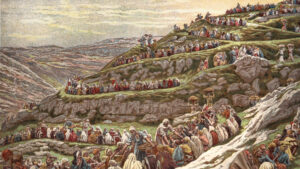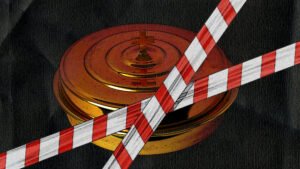Why would a world-renowned defender of Christianity write about all the terrible things Christians have done?
That’s what I wanted to ask John Dickson, author of the new book, Bullies and Saints: An Honest Look at the Good and Evil of Christian History (Zondervan). Dickson has written more than 20 books and hosted two television documentaries in addition to his podcast, Undeceptions.
Dickson takes an honest look at the church’s successes and failures. On the one hand, he warns readers not to depend too much on Christian behavior to boost their faith. He writes, “Disregarding Christianity on the basis of the poor performance of the Church is a bit like dismissing Johann Sebastian Bach after hearing Dickson attempt the Cello Suites.” At the same time, he’s torn about the disconnect between the life and teaching of Jesus and the behavior of his followers. “God’s love must animate the Christian’s love for all,” he writes. “The obvious fact that this moral logic did not translate into a consistent moral history is the dilemma at the heart of this book.”
These days you’ll see many Christians defend the faith by pointing out the problems with others. But owning up to ways the church has fallen short of its own ideals may be the more appropriate path. After all, no one in our lifetime could have invented a more damaging attack on the church than the scandals involving the cover-up of abuse toward children. Those wounds are entirely self-inflicted.
Dickson sums up history by observing, “Bullies are common. Saints are not.” So on Gospelbound, I dug in on his survey and asked whether Christianity has been a bigger contributor to evil than atheism and Islam; his high and low points in Christian history; and why Christians are cheerful losers.
Transcript
The following is an uncorrected transcript generated by a transcription service. Before quoting in print, please check the corresponding audio for accuracy.
Collin Hansen: Now why would a world-renowned defender of Christianity write about all the terrible things Christians have done? That’s what I want to ask John Dickson, author of the new book Bullies and Saints: An Honest Look at the Good and Evil of Christian History, published by Zondervan. Dickson has written more than 20 books and hosted two television documentaries in addition to his podcast, Undeceptions. Dickson takes an honest look at the church’s successes and failures, and I’m not sure I’ve ever seen that combination before in one title. On the one hand, he warns readers not to depend too much on Christian behavior to boost their faith. He writes this: “Disregarding Christianity on the basis of the poor performance of the church is a bit like dismissing Johann Sebastian Bach after hearing Dickson attempt the Cello Suites.” At the same time, he was torn about the disconnect between the life and teaching of Jesus and the behavior of his followers.
And he writes this: “God’s love must animate the Christians love for all the obvious fact that this moral logic did not translate into a consistent moral theory is the dilemma at the heart of this book.”
These days you’ll see many Christians defend the faith by pointing out the problems with others, but owning up to the way as the church has fallen short of its own ideals may be the more appropriate path. After all, no one in our lifetime could have invented a more damaging attack on the church than scandals involving the cover-up of abuse toward children. Those wounds are entirely self-inflicted. Dickson sums up history by observing that bullies are common, saints are not. So on Gospelbound, I’ll dig in on his survey and ask whether Christianity has been a bigger contributor to evil compared to atheism and Islam, his high and low points in Christian history, and why Christians are cheerful losers. John, thank you for joining me on Gospelbound.
John Dickson: Thank you, Collin. It’s good to chat with you, mate.
Collin Hansen: John, describe the moment you sensed a loss of faith in the church.
John Dickson: Well, there were probably a couple of times and some of them came as I was writing the book itself, I must say, but I suppose you’re referring to one that I even mentioned in the book, and that is standing on the spot outside the Al-Aqsa mosque, third-most-moly site in Islam. And I was filming scenes about the Crusades. And this is the site of a massacre that in our sources is no doubt exaggerated, but even if you take the exaggerations out, it was a wholesale slaughter of Muslim men, women, and children by devout Christian fighters. And they were merciless. They broke all the rules of just war, which had already been part of the medieval tradition. And just showed no mercy. It was a frenzy, and then two days later, but no, rather the next day they held a thanksgiving service in the Church of the Holy Sepulchre to praise Jesus for this elevation of Christianity over the pagan as one source puts it.
So standing in that spot, filming that scene was difficult in itself, but right in front of me next to the cameraman that I was delivering my lines to was my Muslim guide. And she, by the end of my doing the take, repeatedly to get my lines right, had a tear in her eye. And I was suddenly confronted by the fact that Christian bad behavior has a 900-year-old wound among Jerusalem Muslims. And I know all of the background of the Crusades and I agreed that the First Crusade can be described as a just war, a response to Muslim aggression. Totally. I’m all over that. But what they did that day was despicable, and there doesn’t seem to be much apology for it. In fact, they thought it was a great elevation of Christianity over the world. So yeah standing there confronted with this Muslim woman for whom it was still a live wound, it was pretty hard to say that I believe in the holy catholic church as we do in the Apostles’ Creed.
Collin Hansen: It seems like, John, the beginning of every conversation about Christian history and apologetics, it seems starts with the Crusades, but you cover this quite a bit in the book. When did Muslims start telling the story of the Crusades with themselves as the victims rather than as the conquerors?
John Dickson: Well, this is one of the best-kept secrets of the whole show. I mean, all of the major Crusades textbooks, academic textbooks, the ones that aren’t engaged at all in apologetics that point out that it’s really ironic because the Crusades were really unsuccessful as wars, apart from an 80-year period following the First Crusade. The Europeans basically were not able to hold the lands that they tried to hold. And every time they went back for the second and third and fourth and fifth crusades, they couldn’t get Jerusalem and hold on to Jerusalem. So they were a complete failure. Muslims saw the Crusades as proof, more proof of the wisdom of monotheism over the lies of Trinitarian polytheism. Until the late 19th century and early 20th century, when one of the Turkish rulers noticed the encroachments of Europe in the Baltic regions, completely unrelated to anything to do with the Crusades, called it a new crusade.
And from that moment on we can date it precisely, from that moment on the Muslim world, because his remarks were reported very widely, the Muslim world began to call all Western encroachments on Islam and on the lands where there are Muslims a crusade. And because the Europeans have been far more successful in the 20th century and 21st at bullying Muslim nations, the crusades have weirdly taken on this reputation that they were bully wars. Successful bully wars. But they were nothing of the sort, they were abject failures.
Collin Hansen: So essentially the decline of the Ottoman Empire.
John Dickson: Yes.
John Dickson: Exactly. As the Ottoman Empire declined, and of course Britain took over parts of their land. And then into the 20th century the policies that supported Israel against other Muslim nations, these were all given the language of crusades. And then we talk about the Iraq war and the Afghanistan war, and America, and England, Australia, have always been the bullies because we have been more successful at wars now than the crusaders, the actual crusaders ever were.
Collin Hansen: Right. John, why do you feel compelled as a Protestant to take responsibility for all of the terrible things that Catholic and Orthodox Christians have done? I mean, it’s not like Protestants, haven’t done bad things too, but I’m just wondering why grab all their stuff too?
John Dickson: I really wrestled with this, as I thought about it. It would be an easy tactic of course, to just say the Catholics did some terrible things. They had their inquisitions and crusades. But it dawned on me that I also rather like St. Augustine. And I know you do too. He influenced the Reformed tradition more than any of the other ancients. But of course he was not faultless. And so what do we do with his just war theory? Which is really the origins of old notions of Christian warfare. Their Cappadocian fathers are also part of our history. They’re the ones who really explained to us how you can talk about the Trinity in a coherent way. How does the father, son, spirit really relate to each other? Well, you’ve got to draw on the Cappadocians for that. Gregory of Nyssa, Nazianzus, and Basil of Caesarea.
So if you want them for your theology, why wouldn’t you also say Ambrose of Milan, who at exactly the same time as the Cappadocian fathers, exactly the same time, that exact 35-, 30-year period, was I mean, bullying people, including the emperor. And when the emperor tried to make Christians pay for a synagogue they burnt down, Ambrose flexed his muscles and said, “No way are we going to rebuild this temple to Satan.” And he got his way, right? So my point is, if I want to keep the Cappadocian fathers in my pool of awesomeness for Christianity, I have to also include Ambrose of Milan, who was something of a bully.
Collin Hansen: One point I thought was interesting in the book is you talk about how a lot of what we know about the bad things about the church are because of Protestant polemics against the Catholic church, or at least that was a major theme there. And that actually was something that came up in a previous gospel bound interview I did with Alec Ryrie about his book, Unbelievers: An Emotional History of Doubt. He talks about the conditions of secularism having been considerably aided by Protestant anti-Catholic polemics, which were easily modified into anti-church polemics in general. If you could identify John, a particular low point in Christian history, what would it be?
John Dickson: Well, in some ways I have to say the child sexual abuse.
Collin Hansen: Okay. Wow, so our time, basically.
John Dickson: And so we are probably living in the darkest age of the church. I don’t think the Crusades or even the Inquisitions. These things were built up. And as you mentioned, Protestants actually were part of the propaganda against the Inquisitions, part of what left the impression in Europe, that they were worse than they really were. And that the documentation we now have indicates the Inquisitions were terrible by any standard, let alone current Christian standards. They were nothing near as bad as the secular courts of the same time.
So you think through all of that, the child sexual abuse, which has been found out to be not just a Roman Catholic problem. I know that was an easy thing to say when all of this started in Ireland in the 1990s and the early two thousands. And then it leapfrogged over to Boston and those Boston Globe articles. But actually the best research on this has been done by a Royal commission in Australia. Royal commission is the elite kind of commission you can have, investigative commission. And they really did find that while it is more prevalent amongst Roman Catholic institutions, it’s also in evangelical institutions, the Salvation Army, Pentecostal groups, it’s… and coverup is the same.
And that is really the compounding thing. It is a tragedy that there would be any pedophile pastor, yes. But what a tragedy that there are pastors willing to cooperate in hushing these things up. That is just despicable. When we follow the one who said, take the log out of your own eye, then you’ll see clearly. And I’ve often thought of my book as an exercise in taking the log out of the eye of the church, while not downplaying the manifest beauty of the Christian faith and what it has given the West. And once upon a time, the East, when the Byzantine Empire was current.
Collin Hansen: That was not the answer I expected, John. I thought you’d go Thirty Years War based on that. But that’s a very thought provoking. I’m not going to put these words into your mouth, but I think when you add on to there, the widespread use of abortion, you could just look to see how we treat our children today and that’s the epitome or sort of culmination of all evil we see in the Bible itself. Child sacrifice. And it’s hard to see how you’re wrong about that. So if we live then, John, in maybe the darkest period of Christian history, then seemingly anything would be better. We don’t even have to talk about a golden era. Is there an era you’d want to be transported back to, that you prefer to live in?
John Dickson: Well, I’d rather like my iPhone and the ability to talk to Collin Hansen. So it’d be hard to give up these things, but I have often thought I would rather like to live in sixth or seventh century Byzantine Empire, which was prosperous, which had an explosion of charity, and really hospitals gained incredible momentum in this period and then spread westward. But it was really the Byzantinem Empire, which is the Eastern part of the empire, the Roman Empire that didn’t fall. It just became Christian after Constantine. Constantine moved the capital to Constantinople or what used to be called Byzantium. And so we call that whole Eastern part of the empire, the Byzantine Empire. But it covered all of Turkey, all of Greece, all of Syria, all of Judea and Galilee, all of them in Egypt and North Africa.
And they were thriving intellectually. They’re the ones who preserved our ancient texts of Aristotle, Plato, and Plotinus, and all the great classical texts. It was Christian Byzantine scholars who did that. They established hospitals and charities. They did incredible theological work. So if you press me, I think I’d like to spend a month there.
Collin Hansen: Okay. I could see that you go back to the origin of hospitals, even though we’d prefer today’s hospitals that have advanced over time.
John Dickson: I just love the thing they were able to pull off. They were still in that sixth century going, “Wow. How did that happen? That the Lord allowed us to do so much good in such a short amount of time.” And this is the irony of this whole notion of Christendom. Yes, there were bullies in Christendom that we can all lament, but actually they did enormous good. The fact that the church became a bit of a bully was wonderful for the poor. I have to remind myself this. When I criticize Ambrose of Milan as a bully, I mean, he was a former senator then became bishop. And he just continued to act like a senator, but he was so pro-poor that the welfare institutions that he developed, if you were back in Milan at the end of the fourth century, and I tried to pull off my Ambrose is a bully argument, they’d say, “Ridiculous. Look what he’s done for the poor.” So there are paradoxes everywhere.
Collin Hansen: I like the way you frame the dilemma that we’re looking at here overall with this book, again, Bullies and Saints: An Honest Look at the Good and Evil of Christian History. This is the way you frame it. John: “The relative lack of fixed social patterns in Christianity, combined with its missionary zeal, is one of its deepest vulnerabilities. Christians are prone to adopting local norms and accommodating themselves to the local context. The capacity and desire to fit in to a host culture makes them susceptible to the temptation to sacrifice some of their own ideals in an effort to win friends and influence people.” Just take us a little bit deeper into this dilemma of how you see it play out against this huge canvas of Christian history. What do we make of that for our own practice today?
John Dickson: Wow. Well, I mean, this is one of the current questions that come out of what is really just an attempt to do some pretty good history. But the church was already always so flexible at the cultural and social level. So the church could move into the Frankish kingdoms of the fifth century and it didn’t have to remain Roman. It could very easily become Frankish because although they cling to a creed that don’t cling to a culture. But what that meant was this, if you’re not really careful that social flexibility to be Frankish or Saxon can very easily become, “Let’s adopt Frankish and Saxon warrior culture too.”
And indeed, we can see this in real time because we have these amazing poems produced by Christians where the gospel, that story in the Gospels is retold with Jesus as a warlord, traveling with his war band, who are the apostles.
And although it’s probably metaphorical this great Saxon poem called “The Heliand,” really is buying into what pagan warrior culture in the medieval period, because it’s trying to say, “Look, Jesus is like the great warrior.” And they even retell the Sermon on the Mount. That basically turns to the sermon on the mount into a, “We can be honorable, nice, merciful warriors.” Okay. But of course in the course of time, the church is totally enveloped in that culture. Now that’s just one example. I can give many, unfortunately.
And I think we see it today, our desperation to reach American culture, Australian culture right now can get to the point where we adopt American and Australian secular values over gospel values. And it’s in an effort to relate in order to convey Jesus, but actually you end up conveying a Jesus who in the medieval period was a warrior or in our period was just the nice guy, who’s happy for everyone to do everything that they like, because he loves you. I think that is just completely worldly. It’s exactly the same thing.
Collin Hansen: Yeah. We could take a lot of tangents off that one. That’s why I wanted to introduce that concept because it’s amazingly helpful to be able to look at history through that lens and also to look anywhere in our own day. And it works in Australia and in the United States and anywhere else this happens because of this indigenous principle of Christianity. It fits into any context, but also critiques each context. And the whole deal of discipleship is to differentiate between the two and what to critique and what to live for.
John Dickson: Fortunately, the Lord raises up reformers through all of history. I don’t just mean the great 16th-century reformers, but throughout history that always reformers, who’s saying, “No, hang on. That doesn’t look like what’s in the gospel.” And so even in this terrible period where there are bishops sidling up to the Frankish warriors to say, “Oh, we will send you our missionaries with your Frankish warriors. And we’ll set up monasteries,” completely endorsing violence in this way.
At the very same time, you’ve got someone like Boniface, who is preaching to the hardest of the hard pagans and has enormous success, but will only do it through persuasion, because we have his letters and we have letters to him. We know he was absolutely committed to simply preaching Christ and arguing people into the kingdom. Well, he was eventually martyred, but he was a reformer at the wealthy point of the church collaborating with the Frankish empire.
You get a bishop like Eligius in the north of France who had some kind of conversion experience that meant this very wealthy man and jewelry maker just started giving away all his jewelry and freeing slaves in the seventh century with his money. Because there were still hundreds of thousands of slaves held by the Saxons, held by the Franks, left over the Roman Empire. And he would just go around Europe, buying them and setting them free with no obligation.
Then we can go to the 10th century and look at Odo, the great reformer who reformed all of the monasteries of Europe, because he ended up saying, “We are so wealthy here in France, in Christian France, that we don’t look like Christians anymore. In fact, maybe we are worse than Christians.” And his message spread like wildfire. One of my biggest takeaways, it’s interesting that you keep on landing on all these big takeaways. That’s absolutely right. But perhaps my biggest takeaway is the Lord will not let his gospel go without a witness. In every age, he will raise up someone to say, “No, we have compromised. We must get back to the Lord Jesus and look like him and serve the world.”
Collin Hansen: Is that what you mean then, John, about saying that sometimes the darkest and brightest moments of church history happened at the same time? Because that’s when he raises up the reformers when that witness is being eclipsed. And so you see the best come right out of the worst?
John Dickson: Yes, exactly. I gave you the example of Ambrose at the end of the fourth century is exactly the same time as the Cappadocian fathers establishing the first hospital. So that’s a good example. Eligius in the seventh century is a good example, Odo in the 10th and 11th centuries, good example. Whatever we might make of Francis of Assisi, I don’t know what to make of him, to be honest with you. But he was an extraordinary figure who ended up appearing in the crusade and begging the crusaders to let him go across the enemy lines and try and convert the Sultan. He got beaten up and only just survived for his trouble, but he wanted to preach the crucified one to the Sultan. That stood as a contrast to the sort of violence and quite wealthy crusader motif.
And I think did some good, but then obviously in the 16th century there were reformers who we know, but I think they’re just part of a tradition where the Lord is always raising up reformers.
And I think of this modern period. Yes, I said the darkest period that I know of in all of church history was just last week, pretty much in the course of time, the child sexual abuse. But also this is an extraordinary time where the church is doing amazing good around the world. The research into the contribution of Christianity to social capital is now clear. There’s lots of American studies, there are British studies, there are Australian studies, that show that the church is at the forefront of caring for the poor. They’re at the forefront of still freeing women from trafficking. They’re at the forefront of charity in Africa. And so yes, the worst times, and the best times are often the same period.
Collin Hansen: This is why I wanted to talk with you about this book, John, because that’s the whole theme of this Gospelbound podcast, my book Gospelbound, is to say, there are all kinds of reasons to feel anxious about what’s happening. I don’t want to dismiss any of those concerns. And at the same time, you turn that prism from a little bit of a different angle. You trust that God is at work. You start to look for that. And all of a sudden you start to see the best come out. Just doesn’t show up on Twitter very well, but it’s God at work, nevertheless, and that’s the stuff of good, careful, historical God trusting history.
Based on your view of Constantine, how do you see Christian pursuit of power relating to our evangelistic and apologetic witness?
John Dickson: Well, I think Christianity does fine without any power. Because the most striking and successful period of church history was probably the third century. The first is exciting, but they’re so tiny, the second is still the same, but the third is where there are real numbers of Christians, but they are still singing the beautiful tune of Jesus, which is love as you’ve been loved. And they are persecuted, but they still say, “Nope, we’re going to serve you anyway.” This is the period where-
Collin Hansen: Cheerful, cheerful, losers. This is where this comes in.
John Dickson: They are cheerful losers. It’s not that they weren’t looking to lose. And nor is it that they had the slave mentality of the loser. When people sometimes hear me talk about the Christians as good losers or cheerful losers, they think, Oh, you’re just saying we should be losing these—no, no. And these Christians of the third and early fourth century were so confident, they thought the thing is, they thought they’d already won. That’s the point. They thought they had already won because Christ had been raised and ascended and was the King. And they just had to preach the gospel. And it’s like, “You might kill me, but you’ve already lost.” So actually they can lose at the social level because they know they’ve already won. So it’s just important to clarify that this Christian humility of that first, second, and third centuries grew out of an extraordinary Christian confidence.
What happens in the fourth century, certainly by the end of the fourth century, but I don’t believe it happened in the early fourth century is that Christian became more insecure. And when you are more insecure, you grab social and political military power to shore up. It’s a compensation mechanism, right? And we all know that the biggest bully in the school yard is usually the most insecure lad in the school yard. And that can happen.
So insecurity can lead to this bully church, but real security in Christ, knowing that you’ve already won in Jesus, that produces a humility and a willingness to be a cheerful loser. On Constantine himself. I don’t subscribe to the view that he was the great downfall of the church. And I spend two quite lengthy chapters analyzing what he did. He maintained a pretty flexible policy, the Edict of Milan and some of the letters he wrote allowed pagans to still be pagans.
He said, “I don’t like paganism. I think it’s the Devil, and it would be great if you all became Christians.” But he also said, “I know if I try and force you to become Christians, as you were just trying to force Christians to be good Romans, it will backfire. So I want you to become Christians, but I’m not going to force you to do it.” And he maintained that policy, right to his end.
But what happens 30 years after Constantine, is Emperor Julian the Apostate, in just two or three years, turned everything back. He sacked all Christian professors of the academies. He sidelined Christian welfare programs. He tried to copy Christian welfare programs. Everyone in his state department who was a Christian had to resign and Christians at the end of his very short reign thought, “Oh my goodness, are we going back to the great persecution at the beginning of the fourth century?”
And well, he was killed on the battlefield in 363, so his reign was very brief. And after him… this is how I understand what happened in the fourth century. After him, Christian said, “Never again. We cannot risk another Julian.” So then they started to use all the means, all the social political legislative means to oppress, repress paganism, sideline heretics. And so by the end of the fourth century, by the time of Ambrose, and then into the fifth century, you are really now getting Christendom.
But it doesn’t really even begin in Constantine. I mean that maybe that opened the door well, a Christian emperor, that is a pretty interesting thing. And by the way, I do think he was as genuine a Christian as we can imagine a Roman emperor to be. When you read his actual writings and letters and decrees, he does not sound like just making a political maneuver. He sounds like he thinks Christ is the Lord. I wish I could have sat down with him and said, “You know, He loves you. And his cross, it’s not just a symbol for the battlefield. His cross means your sins are forgiven and you can rest in that.” I get the sense that he, even to his death, was insecure in the love of God. And I’m not alone in thinking that. Some great scholars have analyzed his material to say, it’s really remarkable. He never speaks of God as loving.
Collin Hansen: Hmm. That’s interesting. So perhaps didn’t think he was deserving of baptism? Why he delayed that maybe?
John Dickson: Well, it was a pretty common thing to delay baptism.
Collin Hansen: Right. Yeah. To your deathbed? That late?
John Dickson: No. No.
Collin Hansen: Okay.
John Dickson: But it is because there was quite a strict… if we had had time, I’d love to talk to you about education, the church and education. They were super nerds, man. None of this, none of this do Christianity Explored and in eight weeks you’re a Christian.
Collin Hansen: Oh yeah. The catechesis back then was serious.
John Dickson: In the year 200, you had to do 144 hours over three years.
Collin Hansen: Wow.
John Dickson: Of learning. And you could do a fast-track version in the year 300 in Jerusalem. That was only 126 hours, but you had to do it in the seven weeks of lent. So someone like Constantine though, could have thought, Well, I haven’t done enough study to really know the faith as I should. And so maybe I don’t deserve baptism. And yes, you and I would think that’s a lamentable way of thinking about it, but it’s understandable I think in his context.
Collin Hansen: Well, I’m going to do a quick final three here with John Dickson, author of Bullies and Saints: An Honest Look At The Good and Evil of Christian History, published by Zondervan. So we’ll go through these quick, John.
Final three, how do you find calm in the storm?
John Dickson: I find calm in the storm by going back to the Gospels. Reading the Gospels, reminding myself who my Lord really is.
Collin Hansen: The voice of Jesus. Can’t go wrong there. Where do you find good news today John?
John Dickson: Same answer brother.
Collin Hansen: Well, you could change it up a little bit.
John Dickson: After writing this book, I think I should just live in the Gospels. I would live in the Scriptures and never emerge. But look, where do I find good news? In the average little local church that’s preaching the Scriptures and trying to form a community of love, that’s just one by one, trying to serve the local community. I think little local churches are where the real action is. And when we get to glory and the Lord opens the books, He’ll say, “Look at that. Look at that little church that did that.”
Collin Hansen: Love it. What’s the last great book you’ve read?
John Dickson: Great book. I’ve read-
Collin Hansen: Got to be great. First one. First one you think of.
John Dickson: The Apostolic Fathers? Rereading the Apostolic Fathers?
Collin Hansen: That’s fine, if that’s the closest one you could grab.
John Dickson:
Well, Richard Bauckham’s Magdala, his new book, which is a history of the town of Magdala where Mary Magdalen was from. Only Richard Bauckham could write a 400-page book on one little Galilean town and actually make it exciting.
Collin Hansen: I like that. I like that. Appreciate this. John Dickson, author of Bullies and Saints: An Honest Look at the Good and Evil of Christian History. John, thanks for joining me on Gospelbound.
John Dickson: Thank you brother.
This episode of Gospelbound is sponsored by The Good Book Company, publisher of the God’s Word for You expository Bible study guides. More information at thegoodbook.com.
Free eBook by Tim Keller: ‘The Freedom of Self-Forgetfulness’
 Imagine a life where you don’t feel inadequate, easily offended, desperate to prove yourself, or endlessly preoccupied with how you look to others. Imagine relishing, not resenting, the success of others. Living this way isn’t far-fetched. It’s actually guaranteed to believers, as they learn to receive God’s approval, rather than striving to earn it.
Imagine a life where you don’t feel inadequate, easily offended, desperate to prove yourself, or endlessly preoccupied with how you look to others. Imagine relishing, not resenting, the success of others. Living this way isn’t far-fetched. It’s actually guaranteed to believers, as they learn to receive God’s approval, rather than striving to earn it.
In Tim Keller’s short ebook, The Freedom of Self-Forgetfulness: The Path To True Christian Joy, he explains how to overcome the toxic tendencies of our age一not by diluting biblical truth or denying our differences一but by rooting our identity in Christ.
TGC is offering this Keller resource for free, so you can discover the “blessed rest” that only self-forgetfulness brings.
Collin Hansen serves as vice president for content and editor in chief of The Gospel Coalition, as well as executive director of The Keller Center for Cultural Apologetics. He hosts the Gospelbound podcast, writes the weekly Unseen Things newsletter, and has written and contributed to many books, including Timothy Keller: His Spiritual and Intellectual Formation and Rediscover Church: Why the Body of Christ Is Essential. He has published with the New York Times and the Washington Post and offered commentary for CNN, Fox News, NPR, BBC, ABC News, and PBS NewsHour. He edited the forthcoming The Gospel After Christendom and The New City Catechism Devotional, among other books. He is an adjunct professor at Beeson Divinity School, where he also co-chairs the advisory board.
John Dickson (PhD, Macquarie University) is is the Jean Kvamme Distinguished Professor of Biblical Studies and Public Christianity in the Litfin Divinity School at Wheaton College. He is the host of Undeceptions podcast. John now lives in Wheaton with his wife, Buff. He has three adult children in Sydney.


































